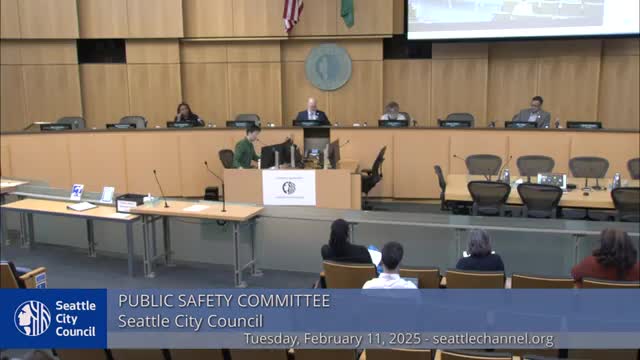Seattle Municipal Court leaders outline technology, staffing and diversion priorities
Get AI-powered insights, summaries, and transcripts
Subscribe
Summary
Presiding Judge Crawford Willis and Court Administrator Josh Sattler briefed the City Council Public Safety Committee on the court's 2024 accomplishments — including a $55 million case management system — current staffing pressures for marshals and plans being discussed for a citywide drug diversion program.
Presiding Judge Crawford Willis and Seattle Municipal Court Administrator Josh Sattler told the Seattle City Council Public Safety Committee on Feb. 11 that the court has completed a costly case management system implementation and is preparing for operational pressures tied to marshals, pretrial changes and potential traffic-camera evidence growth.
The update, delivered to the Public Safety Committee chaired by Councilmember Robert Kettle, laid out 2024 accomplishments and 2025 priorities and warned that marshal vacancies and new operational demands could strain court operations.
The court moved to a new vendor-based case management system last March after a six-year, city-funded project. "This was a 6 year 55000000 dollar investment, from the city," Court Administrator Josh Sattler said, adding the system went live on time and on budget but required deferred functionality to meet the launch date. Sattler said the system is now approaching its first year in production and is "pretty stable," though periodic outages for maintenance remain a pain point for staff and stakeholders.
Judge Crawford Willis described the court’s role and priorities and said her office will continue specialty-court work including mental-health court, veterans treatment court and domestic-violence docketing. "We are the judicial branch of the city of Seattle, Seattle Municipal Court," she said, explaining the court adjudicates misdemeanors and gross misdemeanors under the Seattle Municipal Code and the Revised Code of Washington.
Why it matters: Committee members stressed that the court is an essential node in a functioning criminal-justice ecosystem. Disruptions in data exchange, staffing shortages and changes at the King County Jail will ripple through police, prosecutors, defense and court operations, affecting public safety response and case outcomes.
What the court reported - Case management system: The court launched a vendor-supported case management system last March after a six‑year project. Sattler said some deferred features remained at launch and that full benefits depend on data exchange with partner agencies, most notably the City Attorney's Office. - Staffing pressures: Sattler reported two marshal vacancies and warned that onboarding can take six to nine months. He said the number of high‑security defendants transported to court rose 39% in the past year, and the count of “ultra-security” defendants rose 200%, increasing marshal workload because some transports require two marshals. - Data exchange: Sattler and Judge Willis said manual processes persist because the City Attorney's Office has not yet migrated to a compatible case-management system. The committee chair said the court–attorney data exchange deadline could not be pushed further and asked staff to follow up with the Administration and IT leadership. - Traffic cameras and workload: The court asked to be included in planning for any traffic-camera expansion, because new automated violations would be routed to municipal court and could substantially increase caseloads. - Proposed Seattle Drug Diversion initiative: Court leaders described an early-stage concept, led by the City Attorney's Office with court involvement, for a Seattle Drug Diversion program that would give some people charged with drug possession an opportunity for referral to treatment and court-managed supervision rather than prosecution. Sattler said the proposal would require new funding for the court and the City Attorney’s Office, and that pretrial services would help manage referrals.
Committee concerns and next steps: Council members praised the court’s collaboration and urged follow-up on marshal staffing and the court–City Attorney data exchange. Chair Kettle said the committee would press the Administration for attention to the data-exchange delays and consider budgetary options for additional marshal positions. Judge Willis and Mr. Sattler said they would continue stakeholdering the drug diversion concept before any formal proposal arrived at council.
Limitations and open items: The court identified two marshal vacancies and provided percentage increases for certain transport categories; it did not provide an exact timeline or budget request for adding marshal positions during the briefing. Sattler said the City Attorney’s planned case‑management system go‑live had been delayed nearly a year, slowing back-end efficiencies but he did not give a specific date for that deployment.
Ending: The committee closed the briefing by noting the briefing would inform future oversight and budget conversations; councilmembers said they plan continued engagement with the presiding judge and court administrator on staffing, data exchange and the drug diversion proposal.
